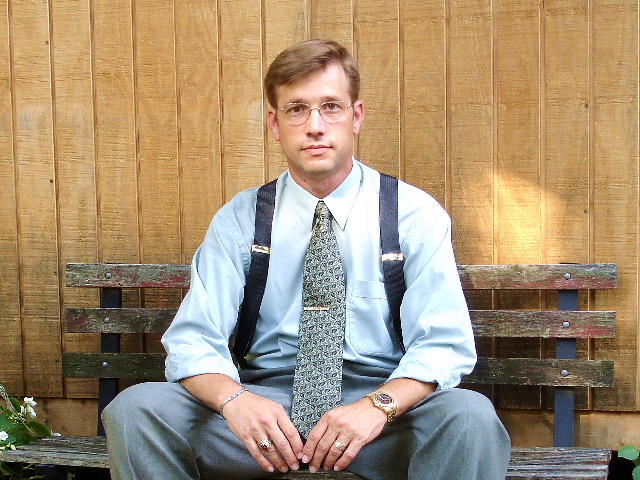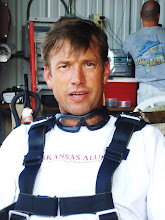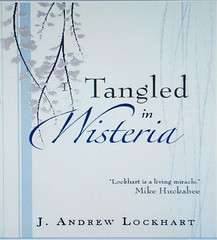a collection of haiku, tanka, haiga and other forms of poetry
Monday, July 17, 2006,10:46 PM
Interview from "Magnapoets"
MAGNA ON MAGNA Poet's Speak

Featuring J. Andrew Lockhart
Question: Tell us all about yourself.
Answer: I've lived most of my life in Van Buren, Arkansas, which is a fairly small town next to the Arkansas River and the Oklahoma border. (It's hard for me to imagine living in a town that's not next to a river). I've been married 17 years and we have 2 boys and 2 girls. (The younger boy is due this October).
I've been in many cities in many countries, but I've always felt that I belonged in Van Buren. There have been Lockharts living here since the mid-1850's, so maybe it's an inborn thing.
I attended the University of Arkansas from 1984 to 1991, receiving a Bachelor in Arts (Music) and a Juris Doctor. In 1996, after practicing law for 5 years, I had a hemorrhagic stroke. I had brain surgery and lost a small part of the left side of my brain. After 6 weeks in the hospital and 3 weeks at the Baylor Rehabilitation Hospital in Dallas, Texas, I went through 3 years of rehabilitation dealing with walking, talking, writing and reading.
I have no memory of the stroke and almost a year after it. My reading and writing are still shaky, but they're improving. (If it weren't for Google spell check, though, I never would have started my blog).
In 2001, I started a part-time job as a Spanish teacher at Rena Elementary School. I fell in love with it and went through the non-traditional licensure class to become certified as a music teacher, and have been the music teacher there for the last three years. I absolutely love it and feel that it's a hobby rather than a job.
Question: How did you come to choose the Japanese forms?
Answer: I really don't remember when I first ran into a haiku on the internet. At first, I saw it as an easy way to express my feelings. It didn't take long, thought, for me to see how much deeper the form is. I'm still learning, but it's an exciting education.
Soon after that, I discovered tanka. The depth of emotion that can be used in a tanka has made it my favorite. The main thing is focus, focus and focus. It's a challenge to take a thought or an emotion and fit it into a certain form. It also cuts out the unnecessary parts. It goes right along with what I've learned about teaching children, where something has to be short and to the point.
I also plan to learn more about haiga, haibun and others.
Question: What do you get out of blogging?
Answer: I first heard about "blogging" last spring. It seemed interesting to me, so I decided to play it out.
My first blog was a personal political rant. It felt good to yell out my opinions, but I soon noticed that there were no productive ideas and most, if not all, of my writing was negative. I still loved the idea, though, so I decided to start a poetic blog. Soon after that I met different people from around the world and was hooked.
I have seen so much work by so many people and I'm able to discuss the work with the person that writes it. This could never be done in a library.
Question: Who are the artists that are most important to you?
Answer: As far as the poetry I write, I have spent a lot of time reading works of Basho, Buson and Issa, but I've learned the most from poets that write in English. For example, Denis Garrison and Robert Wilson are two modern poets that have greatly influenced my writing. There are many others, as well, who give wonderful examples of how Japanese poetry can be written beautifully in English.I have to say, though, that I'm getting closer to trying different forms of poetry.
Question: You frequently address the subject of memory in your poems. What makes this such a meaningful subject for you?
Answer: I'm fascinated with memory due to what happened to me ten years ago. Losing entire blocks of memory is a terrifying experience and you find yourself holding on to the memories that you have.
It seems that I've had two lives and my memories are the only connection. I'm not willing to let go of my past life because so much of me was built on it.
I know that there are many ways to write about wishes or dreams, but I usually would rather use my emotion with reality -- which is either past or present.
Interview conducted by Eric Dutton

Featuring J. Andrew Lockhart
Question: Tell us all about yourself.
Answer: I've lived most of my life in Van Buren, Arkansas, which is a fairly small town next to the Arkansas River and the Oklahoma border. (It's hard for me to imagine living in a town that's not next to a river). I've been married 17 years and we have 2 boys and 2 girls. (The younger boy is due this October).
I've been in many cities in many countries, but I've always felt that I belonged in Van Buren. There have been Lockharts living here since the mid-1850's, so maybe it's an inborn thing.
I attended the University of Arkansas from 1984 to 1991, receiving a Bachelor in Arts (Music) and a Juris Doctor. In 1996, after practicing law for 5 years, I had a hemorrhagic stroke. I had brain surgery and lost a small part of the left side of my brain. After 6 weeks in the hospital and 3 weeks at the Baylor Rehabilitation Hospital in Dallas, Texas, I went through 3 years of rehabilitation dealing with walking, talking, writing and reading.
I have no memory of the stroke and almost a year after it. My reading and writing are still shaky, but they're improving. (If it weren't for Google spell check, though, I never would have started my blog).
In 2001, I started a part-time job as a Spanish teacher at Rena Elementary School. I fell in love with it and went through the non-traditional licensure class to become certified as a music teacher, and have been the music teacher there for the last three years. I absolutely love it and feel that it's a hobby rather than a job.
Question: How did you come to choose the Japanese forms?
Answer: I really don't remember when I first ran into a haiku on the internet. At first, I saw it as an easy way to express my feelings. It didn't take long, thought, for me to see how much deeper the form is. I'm still learning, but it's an exciting education.
Soon after that, I discovered tanka. The depth of emotion that can be used in a tanka has made it my favorite. The main thing is focus, focus and focus. It's a challenge to take a thought or an emotion and fit it into a certain form. It also cuts out the unnecessary parts. It goes right along with what I've learned about teaching children, where something has to be short and to the point.
I also plan to learn more about haiga, haibun and others.
Question: What do you get out of blogging?
Answer: I first heard about "blogging" last spring. It seemed interesting to me, so I decided to play it out.
My first blog was a personal political rant. It felt good to yell out my opinions, but I soon noticed that there were no productive ideas and most, if not all, of my writing was negative. I still loved the idea, though, so I decided to start a poetic blog. Soon after that I met different people from around the world and was hooked.
I have seen so much work by so many people and I'm able to discuss the work with the person that writes it. This could never be done in a library.
Question: Who are the artists that are most important to you?
Answer: As far as the poetry I write, I have spent a lot of time reading works of Basho, Buson and Issa, but I've learned the most from poets that write in English. For example, Denis Garrison and Robert Wilson are two modern poets that have greatly influenced my writing. There are many others, as well, who give wonderful examples of how Japanese poetry can be written beautifully in English.I have to say, though, that I'm getting closer to trying different forms of poetry.
Question: You frequently address the subject of memory in your poems. What makes this such a meaningful subject for you?
Answer: I'm fascinated with memory due to what happened to me ten years ago. Losing entire blocks of memory is a terrifying experience and you find yourself holding on to the memories that you have.
It seems that I've had two lives and my memories are the only connection. I'm not willing to let go of my past life because so much of me was built on it.
I know that there are many ways to write about wishes or dreams, but I usually would rather use my emotion with reality -- which is either past or present.
Interview conducted by Eric Dutton











